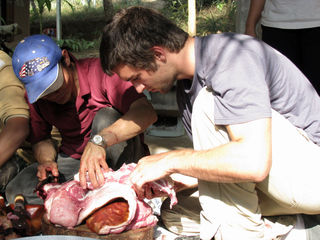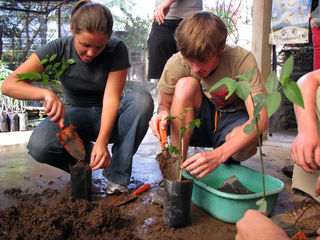Identity
Helping Boys Become Ethical Men
The transition to college is a key moment to create healthy and ethical men.
Posted May 11, 2016
This post was written in collaboration by Amanda Payne and Robin Pendoley. You can learn more about us and our work here.
For young men, the transition to college is a crucial period of time. Developmentally, they are prepared to shape their adult identity, reflect on their values, and establish patterns of social and interpersonal behavior that will define their adulthood. Today, they do this while society grapples with issues of gender equity and sexual assault on college campuses and in society at large. Given all of this, how do we help boys become healthy and ethical men?
Over the past 8 years, we at Thinking Beyond Borders have been working with students in the college transition through our gap year programs. Our unique position outside the limitations of traditional higher education institutions allows us the opportunity to innovate solutions to meeting every student's needs. We’ve decided to share our learnings and approach to helping adolescent boys become ethical adult men in the hope of adding to the research of the problem and potential solutions for traditional colleges and universities.
Defining Success
As educators, we have two priorities in our work with students: to help them become healthier individuals, and to prepare them to make a positive contribution to society. As such, we measure success in shaping young men by the following goals:
- Identity Rooted in a Sense of Self -- Healthy men should have a clear sense of who they are and want to be that is rooted in an understanding of their values, talents, and passions. They should also have a sense of how to shape their lives based on that sense of self.
- Critical Reflection on Societal and Cultural Norms -- Ethical men must be able to think critically about the societal and cultural norms attributed to gender. They must also be able to identify the tensions that reside in those norms in both a political and personal sense. This awareness is essential to empower men to make informed decisions regarding their behavior and relationships with others to advance gender equity.
A Story of Defining One’s Masculinity
Zach, now 25, graduated from high school as a beloved jock. Captain of the football team and star lacrosse player, he says he decided in his teen years to develop his interpersonal skills as a key to success, in part because he didn’t feel confident in his academic ability or the value of his ideas. He truly was beloved on his campus by students, faculty, and staff. He was accepted to a small private college in the Northeast and intended to continue his path as a football player who would somehow find something to major in so he’d graduate with a degree.

Then, he met Chris, a former Division 1A football star whose stories of greatness weren’t from the football field, but from travels abroad pursuing global understanding. This resonated with Zach. He decided to take a gap year that gave him authentic exposure to global issues, immersed him in other cultures, and challenged him to reflect on who he was and wanted to be in the world.
By the time he arrived on his college campus a year later, he felt football was no longer the right fit for him. He saw the types of relationships and masculinity inherent in that environment as something he didn’t want to return to. It was no longer his tribe. What felt more true to his values and passions was to continue examining the world’s challenges and how he could contribute productively. He sought classes that allowed him to push his thinking and joined a university sustainability committee that was comprised primarily of faculty. While these felt a bit closer to his values, he ultimately transferred to a larger state university that would offer more rigor for his academic studies.
As he settled into life on his new campus, Zach learned two things. First, he was classified by other male students as a GDI -- Goddamn Independent. These were male students who were neither athletes nor in the Greek system on campus. GDI’s were generally considered outcasts from the dominant social circles on campus and were treated almost as untouchables for those who were not GDI’s. Second, he learned that his international development studies courses were predominately comprised of women.
Zach had gone from an identity rooted in his athletic prowess and interpersonal skills to one based in academic study and civic engagement. This shift also took him from primarily being surrounded by other men to being surrounded by women. While this represented some inner struggle to feel confident that he belonged in this new environment, he says that the clarity he had about who he was and who he wanted to be gave him resilience to persevere in the process of adjusting to his new environs and identity. While he now feels somewhat removed from the dominant definition of masculinity, he finds confidence in his identity as a man who lives a life that aligns with his values, talents, and passions.
Creating Intentional Transitions to Manhood
There are many ways to help boys become healthy and ethical men. Starting in childhood and continuing through adulthood, there is a clear need to help boys and men critically engage with the pressures that help shape their sense of masculinity. But, we believe the transition to adulthood is a crucial time developmentally to provide intentional time and spaces for boys to become healthy and ethical men.
In Zach’s case, his gap year was that time and space. While this is not necessarily a push for every student to take a gap year, we do recognize that our place outside of traditional educational institutions provides educators flexibility in program and curriculum design that can be hard to replicate on a high school or college campus. We share the following to provoke thought and discussion about what could be done to better support this crucial transition on campuses and in alternative educational settings. The basic itinerary and details for Zach's program are on our website, but the core components that shaped his and our other students’ (both male and female) experiences are:
- Authentic Interaction with the World -- In the US, many adolescents reach the college transition with limited interaction with the “real world”. Engaging with others as a curious adult, citizen, and caring neighbor pushes their understanding of the world, its challenges and opportunities, and their place within it. This provides a more diverse array of potential adult identities they can take on than the limited acceptable ones presented to Zach on campus.
- Mentorship by an Educator to Support Introspection -- Critical self-reflection is a skill that has to be developed and practiced. Adult mentors are key to the process of healthy identity development because they teach this skill. Effective mentors are old enough to have perspective on the transition to adulthood the student is facing and the stages that come after. They are skilled at introspection and how to help others practice it. They care about the student on a personal level but balance that investment with an approach that lets the student think for themselves and take risks in the process of learning and self-discovery.
- Academic Inquiry about the World and Themselves -- Our world and the power dynamics within it are complex. Sometimes, they are hard to see. Without an understanding of the broader context in which we each live, it is difficult to truly have agency in navigating the pressures and influences of society. Academic inquiry into our world enables students to better understand their own values, assumptions, and how to live them in a way that is honest and healthy.
- Trusting and Engaged Peer Group -- Developmentally, 17-19 year olds are peer oriented. The relationships with their peers are intense and play an important role in processing their learning and emotions. These relationships are often the first place they try to live according to their values and chosen identity. They communicate their values and identity to their peers first, carefully assessing their reaction. Having a peer group that is engaged and working within a program culture where honesty, openness, and supportiveness are clearly established ensures each student will receive support from the group they most need at this moment of their lives.
- Intentional Learning Community -- Creating spaces for young adults to explore the many factors that shape their identities is crucial. A combination of same gender and integrated group discussions enable open and honest reflection while also providing deeper insights across gender experiences. Mentors play a key role in these spaces, providing key questions, modeling healthy risk-taking and reflection, and giving vocabulary to the ideas and perspectives uncovered through sharing.

All young people benefit from these same program components. Having a space to build a sense of self, examine how that relates to the broader culture and society, and shaping their identity around their beliefs and passions are crucial components of a healthy adulthood. This transformational space establishes a sense of resilience against societal and cultural pressures by helping students create a vision for who they want to be apart from gender, class, sexual preference, or ethnicity assigned stereotypes. To be clear, this process does not forever “solve” the student’s identity. Rather, it gives them the insight and skills to continue to ask questions of themselves and the world that will shape who they are as adults and members of our communities.
Lessons for the College Transition
Creating a learning and growth environment for students transitioning to college that includes all of these components isn’t easy. For gap year program providers, it means investing in highly qualified staff, offering engaging and dynamic programming, and intentionally designing pedagogy. These are costly investments, but they result in boys becoming healthy young men with the resilience to continue into a healthy adulthood.
For colleges and universities, the challenges can be even greater. While there is significant existing infrastructure and programming that can be utilized in this process, there are also huge challenges to overcome in what most colleges currently offer. For example, while students are often broken into small groups in dorms with assigned Resident Advisors, those advisors are rarely old enough to have the perspective needed to be effective mentors. While classes offer academic study of our broader world, the lack of adult mentorship or authentic interaction with the world leaves many students without a clear understanding of where they fit into the broader society or a vision for who they want to be.
Ultimately, boys will become healthy men with the tools to be ethical actors in society when they have intentionally designed spaces to establish a sense of self and learn the skills to translate that into an identity that represents their values. The college transition is a crucial time for this work to happen, and our hope is that educators working with students in this space take on the challenge of shaping this process.




